News
12.08.2025
DECODE network meeting: discussing the importance of developing competences for democratic culture (CDC) in young learners through language education
Four DECODE project team members and their ECML consultant met with 19 teacher educators, teachers and researchers at the network meeting which was held at the ECML in Graz, Austria, on 24-25 June 2025. The participants were from Belgium, Bosnia and Herzegovina, Croatia, Germany, Greece, Ireland, North Macedonia, Slovenia, Spain, Sweden, and Switzerland.
During the two-day meeting, participants explored how to foster competences for democratic culture (CDC) in young learners through language education. On the first day, the team introduced the CDC model and discussed challenges in language education, the role of CEFR tools, and principles for developing CDC-related materials. A template for CDC materials was presented, and participants shared best practices and identified teachers’ needs. On the second day, they collaborated in groups to create and present initial CDC teaching materials, offering feedback on the template. Five of the network participants also shared highly interesting testimonials (see below) about CDC’s relevance in their professional contexts and the value of the DECODE project. The meeting strengthened understanding of CDC and highlighted the importance of collaboration for successful implementation of the DECODE project.
Authors: Emina Jelešković, Martina Kramar
- ECML project website “Developing competences for democratic culture for young learners through language education” (2024-26) (available in English and German): www.ecml.at/decode
- Video testimonials of network participants from Bosnia and Herzegovina, Greece, German, Ireland, and Sweden: see Recent developments
30.07.2025
Migratory multilingualism in the FREPA
Training workshop “Lebensweltliche Mehrsprachigkeit und Schule. Unterrichtsmaterialien für den Fremdsprachenunterricht im Berliner Kontext”
ECML training and consultancy event in Germany
Date: 24-25 June 2025
Venue: Humboldt-Universität zu Berlin, Germany
Local organisers: HU Berlin : Daniel Reimann, Christian Koch
ECML experts: Michel Candelier, Anna Schröder-Sura
Participants: 30+ participants – foreign language teachers (secondary level), romance language students
Anna Schröder-Sura and Michel Candelier moderated a workshop on the Framework of Reference for Pluralistic Approaches (FREPA) on 24 and 25 June 2025, at the Humboldt University of Berlin. The aim of the workshop was to offer a foundation for designing new Berlin-based reference frameworks focused on plurilingual competence. Thirty participants, mostly foreign language teachers in Berlin secondary schools, were introduced to the FREPA tools. Two new elements stood out in this workshop: the systematic integration of learners’ entire linguistic repertoires – particularly languages of migration – in work using pluralistic approaches, and the use of the new FREPA database, which provides numerous examples of materials in this area. The workshop was further enriched through presentations from the organisers, Daniel Reimann and Christian Koch (both teacher-researchers in the didactics of Romance languages and literature at Humboldt University of Berlin), on the linguistic situation in Berlin and resources related to heritage languages. In addition, Lasse Birger Bohn (teacher-researcher in Romance language didactics at the University of Siegen) contributed with a talk on the use of FREPA descriptors in the design of teaching materials.
Participants’ feedback reflected the valuable contribution the workshop made to the development of linguistically responsive teaching, the establishment of internal school curricula, and the networking between Berlin schools and Humboldt University.
Authors: Christian Koch, Daniel Reimann
Deutsche Version
Fortbildung zum Thema „Lebensweltliche Mehrsprachigkeit und Schule. Unterrichtsmaterialien für den Fremdsprachenunterricht im Berliner Kontext“
EFSZ-Fortbildungs- und Beratungsveranstaltung in Deutschland
Datum: 24.-25. Juni 2025
Ort: Humboldt-Universität zu Berlin, Deutschland
Organisation vor Ort: HU Berlin: Daniel Reimann, Christian Koch
EFSZ-Expert:innen: Michel Candelier, Anna Schröder-Sura
Teilnehmende: über 30 Teilnehmende – Fremdsprachenlehrkräfte (Sekundarstufe), Studierende der Romanistik
Lebensweltliche Mehrsprachigkeit im REPA
Anna Schröder-Sura und Michel Candelier haben am 24. und 25. Juni 2025 an der Humboldt-Universität zu Berlin einen Workshop zum Referenzrahmen für plurale Ansätze durchgeführt. Der Workshop sollte als Angebot zur Gestaltung der neuen Berliner Rahmenstandards zur plurilingualen Kompetenz dienen. Insgesamt 30 Teilnehmende, von denen der Großteil als Fremdsprachenlehrkräfte an Berliner Sekundarschulen tätig ist, konnten dabei aus erster Hand Einblicke in die Instrumente des REPA erhalten. Zwei neue Aspekte prägten den Workshop: die konsequente Einbindung des gesamten Sprachenrepertoires der Lernenden – insbesondere der Sprachen der Migration – in die Arbeit mit den pluralen Ansätzen und die Arbeit mit der neuen REPA-Datenbank, die hierfür vielfältige Materialbeispiele liefert. Abgerundet wurde der Workshop durch Einführungen der Organisatoren Daniel Reimann und Christian Koch (beide Didaktik der Romanischen Sprachen und Literaturen der HU Berlin) zur sprachlichen Situation in Berlin und zu Ressourcen zu Herkunftssprachen sowie durch einen Beitrag von Lasse Birger Bohn (Didaktik der romanischen Sprachen an der Universität Siegen) zur Nutzung von REPA-Deskriptoren in der Materialgestaltung.
Den Rückmeldungen der Teilnehmenden zufolge konnte der Workshop einen wertvollen Beitrag zur sprachsensiblen Unterrichtsgestaltung, zur Entwicklung schulinterner Fachcurricula sowie zur Vernetzung zwischen Berliner Schulen und der Humboldt-Universität leisten.
Autoren: Christian Koch, Daniel Reimann
17.07.2023
ECML x SenBJF – A ROADMAP for schools to self-assess and experience the implementation of individual multilingual projects as an essential part of a whole-school and teaching development
Date and venue of the event: 28-29 June 2023, Zentrum für Sprachbildung, Berlin, Germany
Local organiser: Mr Mehmet Fatih Özcan (Senate Department for Education, Youth and Families, II D 5.2, Advisor for multilingualism / Senatsverwaltung für Bildung, Jugend und Familie Berlin, II D 5.2, Referent für Mehrsprachigkeit
ECML experts: Sophie Babault (France) and Selin Öndül (Switzerland)
Participants: 25 headmasters, (heritage & foreign language) teachers, language development coordinators, subject unit managers, senate administration’s project and programme coordinators and support
The two-day ROADMAP Training and Consultancy workshop, together with the development teams within the framework of the quality label project "Multilingual School" and the expert group II D 5 of the Senate Department for Education, Youth and Family, highlighted areas with high potential for implementing multilingual projects.
The participants discussed and visualised the overlaps between multilingual and intercultural education in terms of content and subject matter, in particular in ensuring awareness and equality of the languages of the students and the school. In this context, the participants developed methods to reflect on the promotion of multilingualism in school development processes and lesson development. The varied application possibilities offered by the ROADMAP self-evaluation tool and database clearly demonstrated that the ambitious quality label project "Multilingual School" can draw on already established and freely accessible resources of the European Centre for Modern Languages (ECML) as a sold basis for a piloting exercise in the 2023/2024 school year at 7 participating schools
Participants emphasized that the tools provided by the ECML would both simplify processes to determine potential developmental areas and provide abundant data and examples of reporting and evaluation.They also mentioned that it was necessary to include both Berlin-specific school structures and, in particular, multilingual questionnaires in the self-evaluation tool.
In summary, the participants received extensive training and became fully acquainted in the use of the ECML tools - in particular in the self-assessment tool, as well as in conceptualization of a customised roadmap to implement development modules within the framework of the “Multilingual School” quality seal.
Mehmet Fatih Özcan
*****
(Deutsch)
Der zweitägige Training and Consultancy ROADMAP Workshop hat gemeinsam mit den Entwicklungsteams im Rahmen des Gütesiegel-Vorhabens „Mehrsprachige Schule“ und der Fachgruppe II D 5 der Senatsverwaltung für Bildung, Jugend und Familie potenzielle Schwerpunkte in der Einrichtung von mehrsprachigen Angeboten sichtbar gemacht.
Die Teilnehmer:innen diskutierten und visualisierten die inhaltlichen und fachlichen Überschneidungen zwischen mehrsprachiger und interkultureller Bildung, insbesondere vor dem Hintergrund des Bewusstseins über, der Gleichwertigkeit von und der Haltung gegenüber der sprachlichen Vielfalt in der Berliner Schule und in der Lebenswelt der Berliner Schülerinnen und Schüler.
Die Teilnehmer:innen entwickelten in diesem Zusammenhang Methoden, um die Förderung der Mehrsprachigkeit in Schulentwicklungsprozessen und zur Unterrichtsentwicklung zu reflektieren. Das vielfältigen Anwendungsmöglichkeiten des Selbstevaluationstools und der Projektdatenbank des Wegweiser-Programms verdeutlichten, dass das ambitionierte Gütesiegel-Vorhaben „Mehrsprachige Schule“ auf bereits gefestigte und freizugängliche Angebote des Europäischen Fremdsprachenzentrums (EFSZ) zurückgreifen kann, um im Schuljahr 2023/2024 an 7 teilnehmenden Schulen pilotiert werden zu können.
Die Teilnehmenden bestätigten, dass die bereitgestellten Tools des EFSZ und die damit zur Verfügung stehenden Daten sowohl die Ermittlung der Weiterentwicklungspotenziale der schulischen Mehrsprachigkeitsförderung als auch die Berichtserstellung und Evaluation deutlich vereinfachen würden. Die Teilnehmer:innen fügten an, dass es notwendig sei, sowohl die berlinspezifischen Schulstrukturen und insbesondere mehrsprachige Fragebögen im Selbstevaluationstool einzubeziehen.
Zusammenfassend kann gesagt werden, dass die Teilnehmer:innen im Umgang mit den EFSZ-Tools und ihre Einbindung in das Gütesiegel-Vorhaben umfangreich geschult und weiterqualifiziert werden konnten.
Mehmet Fatih Özcan
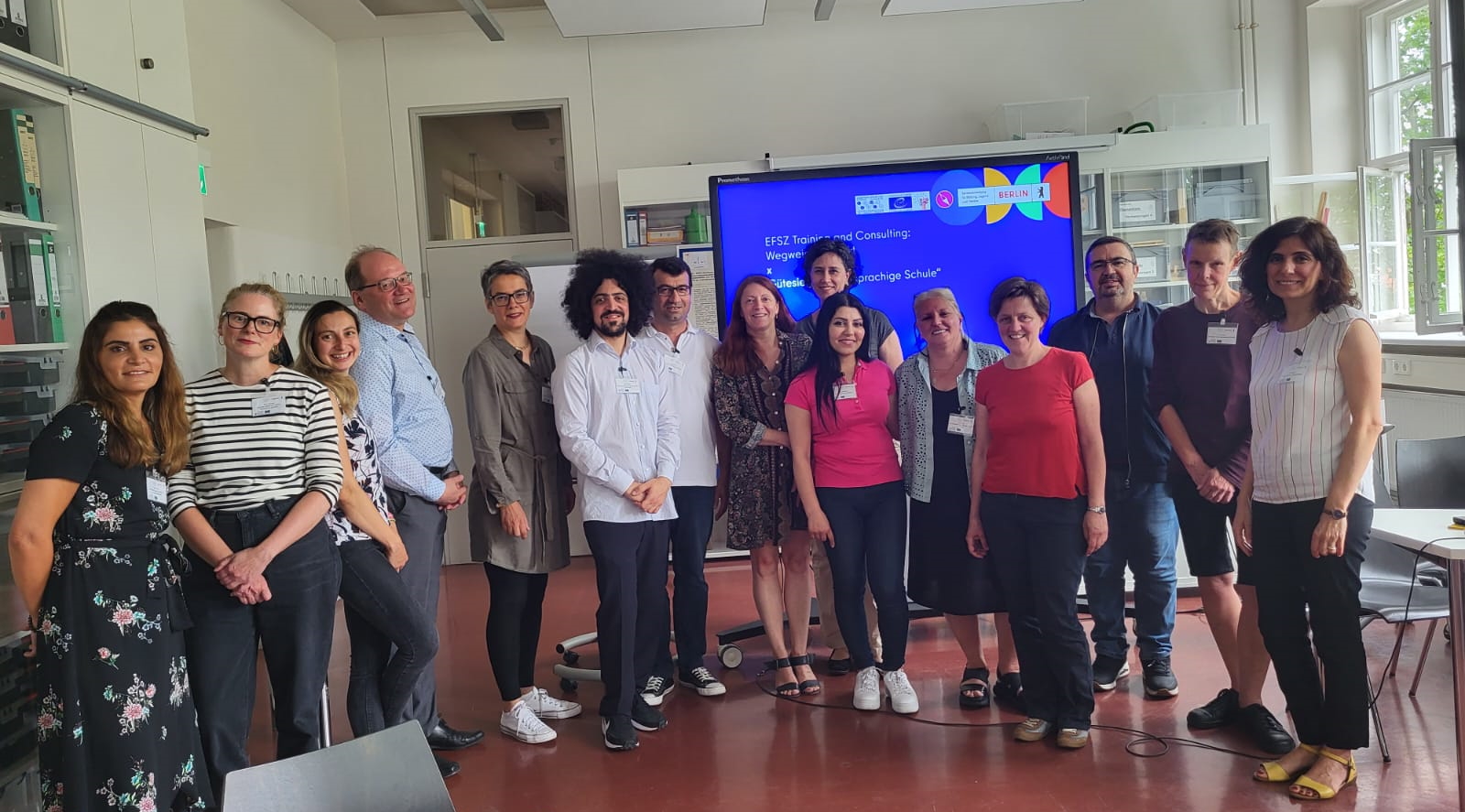
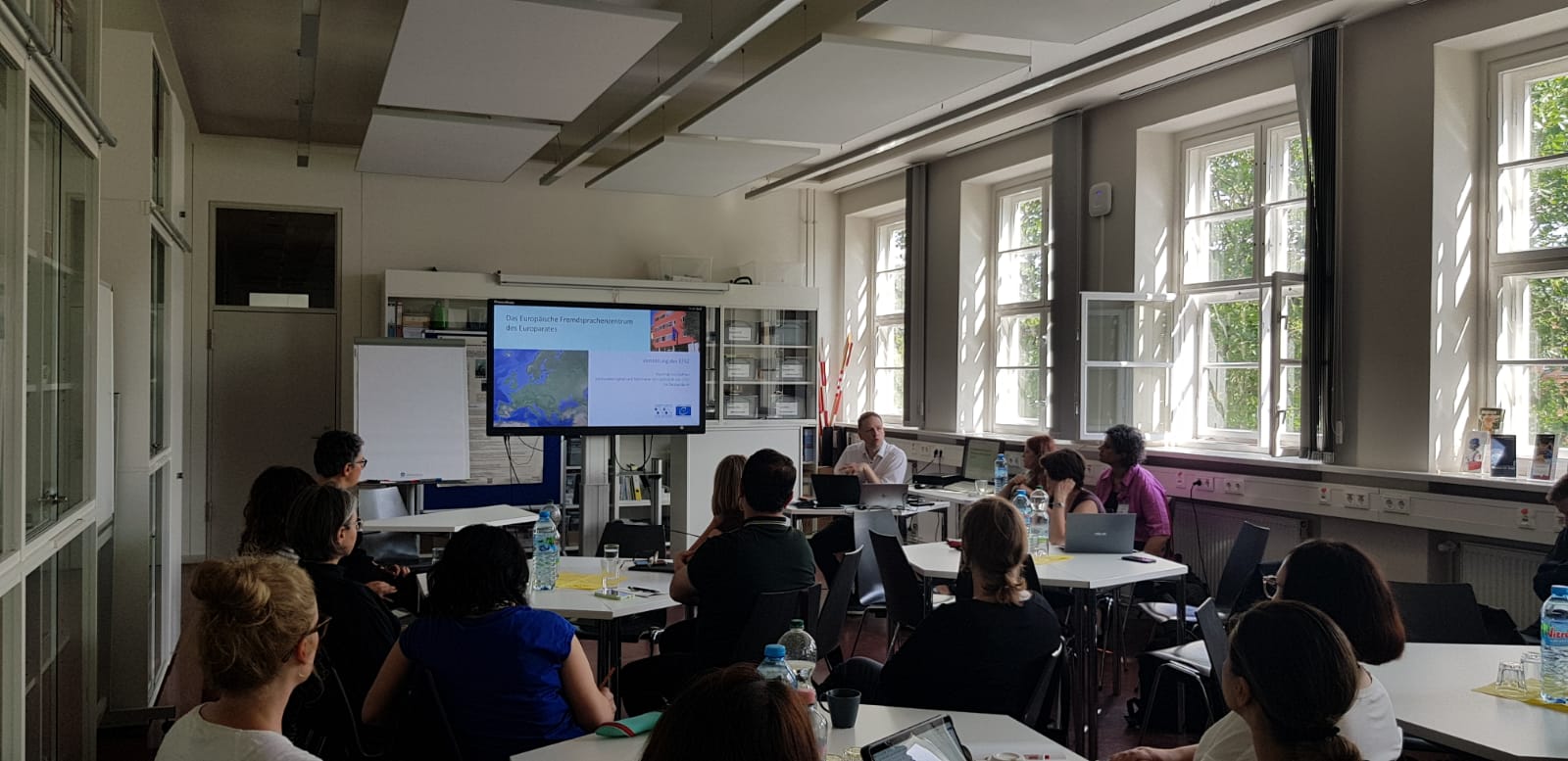
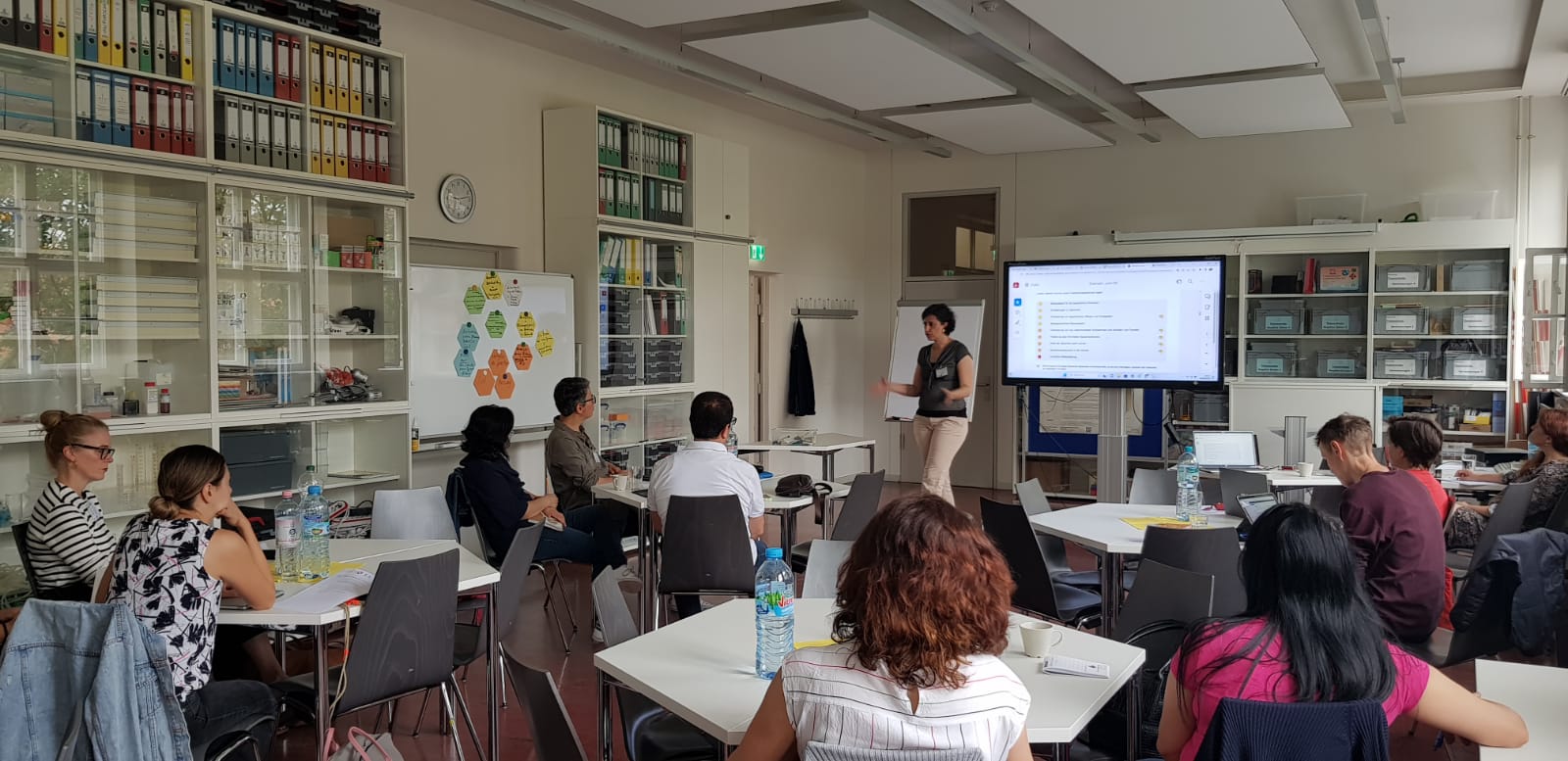
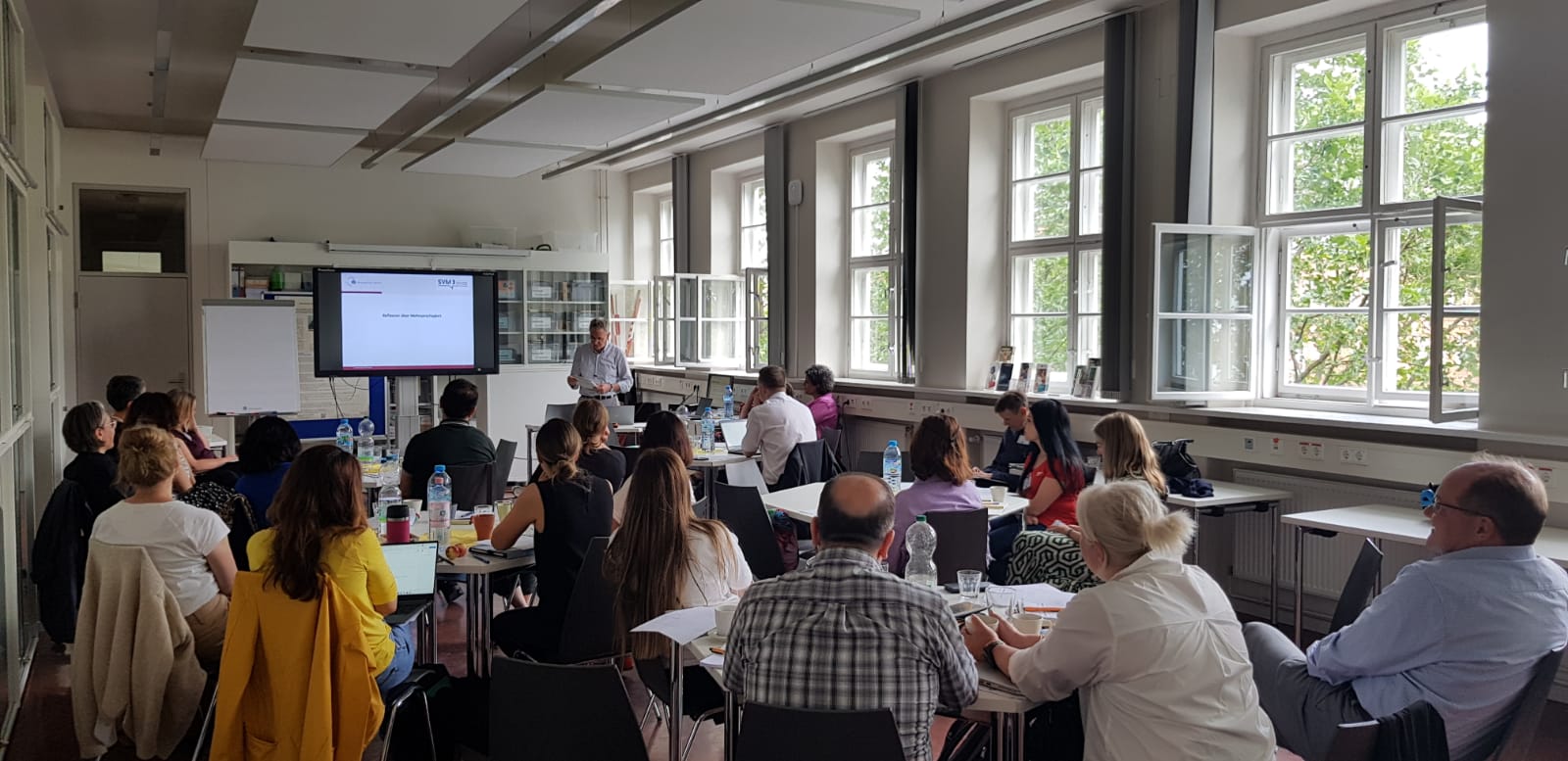
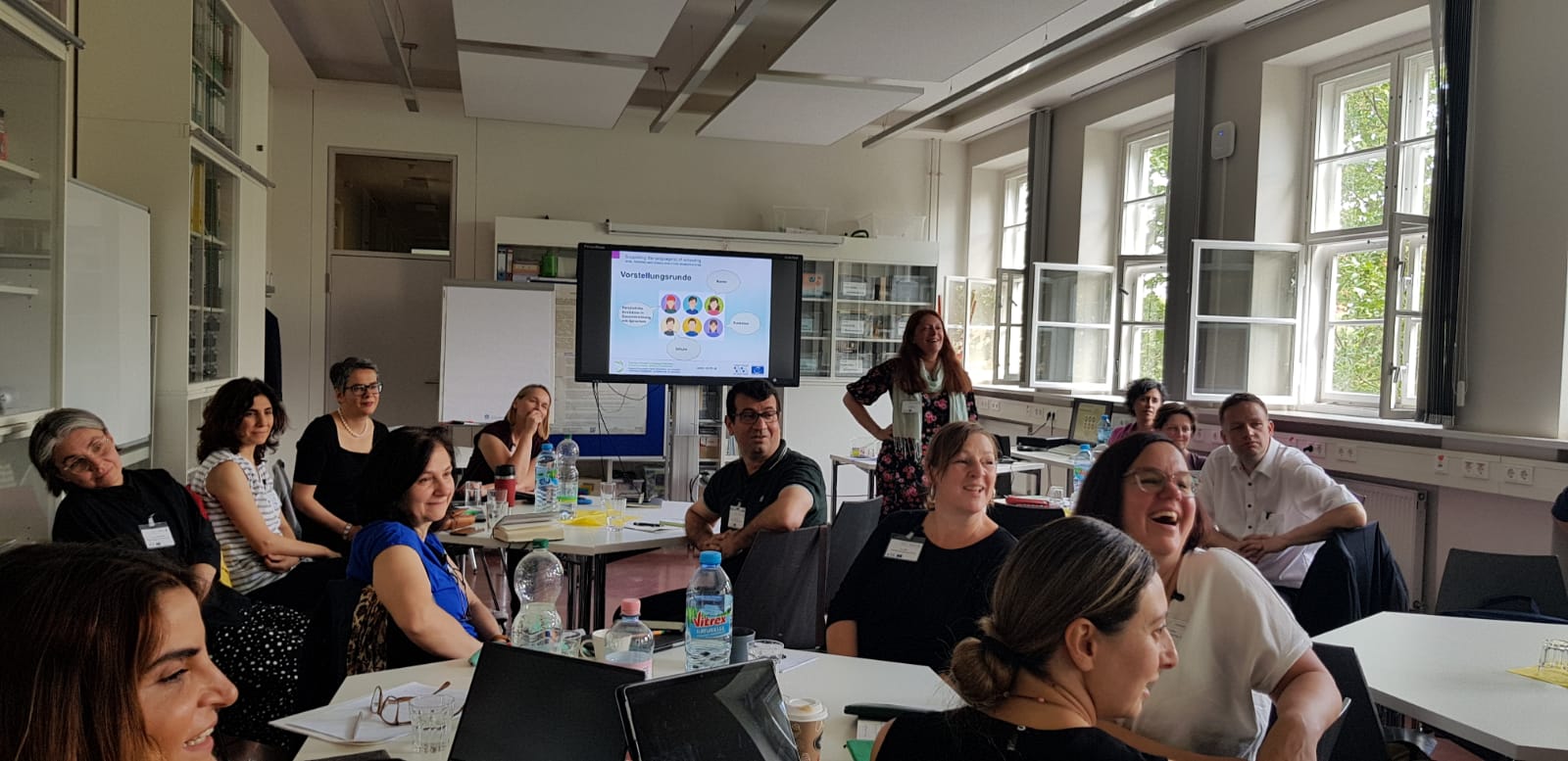
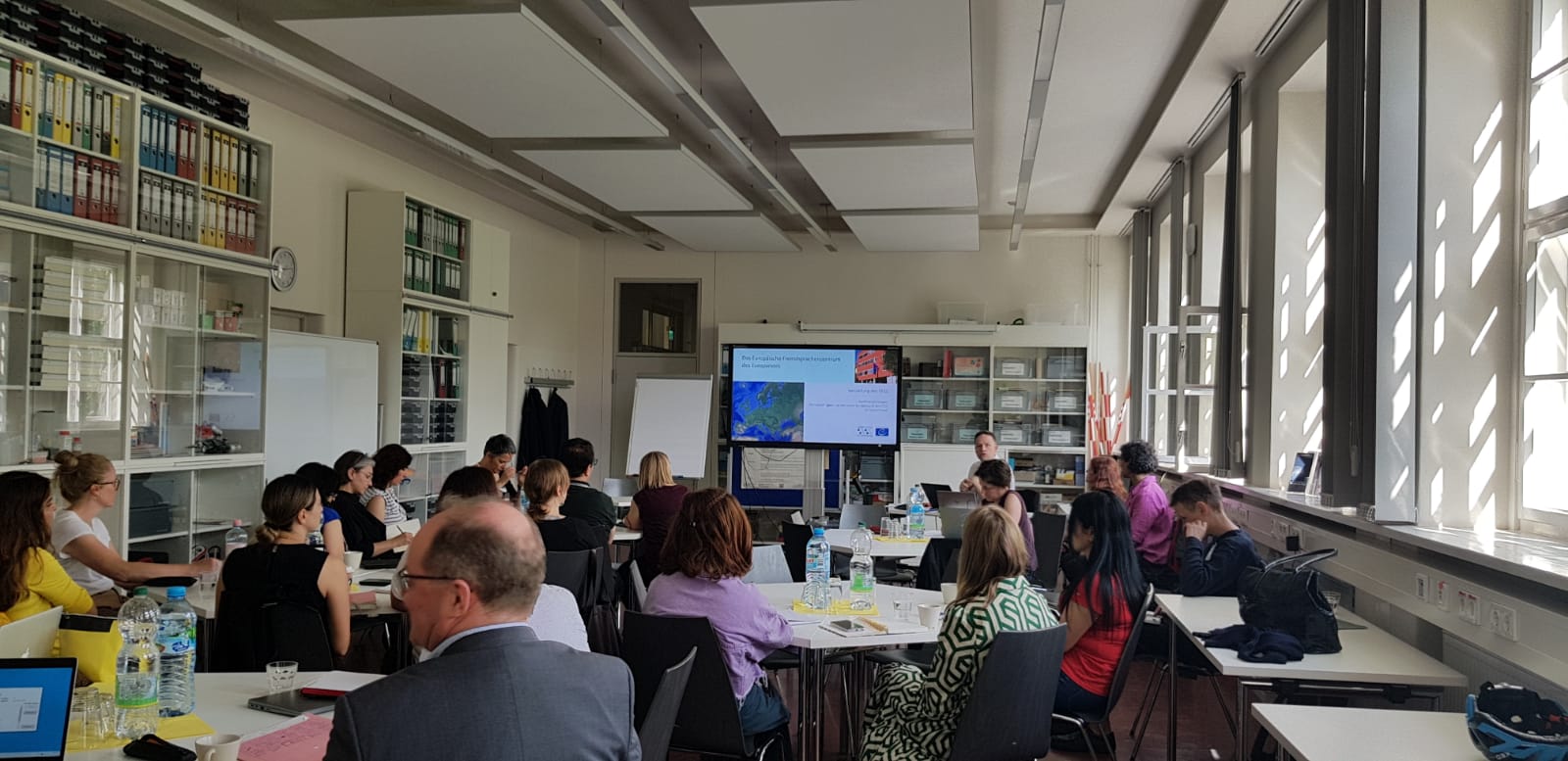
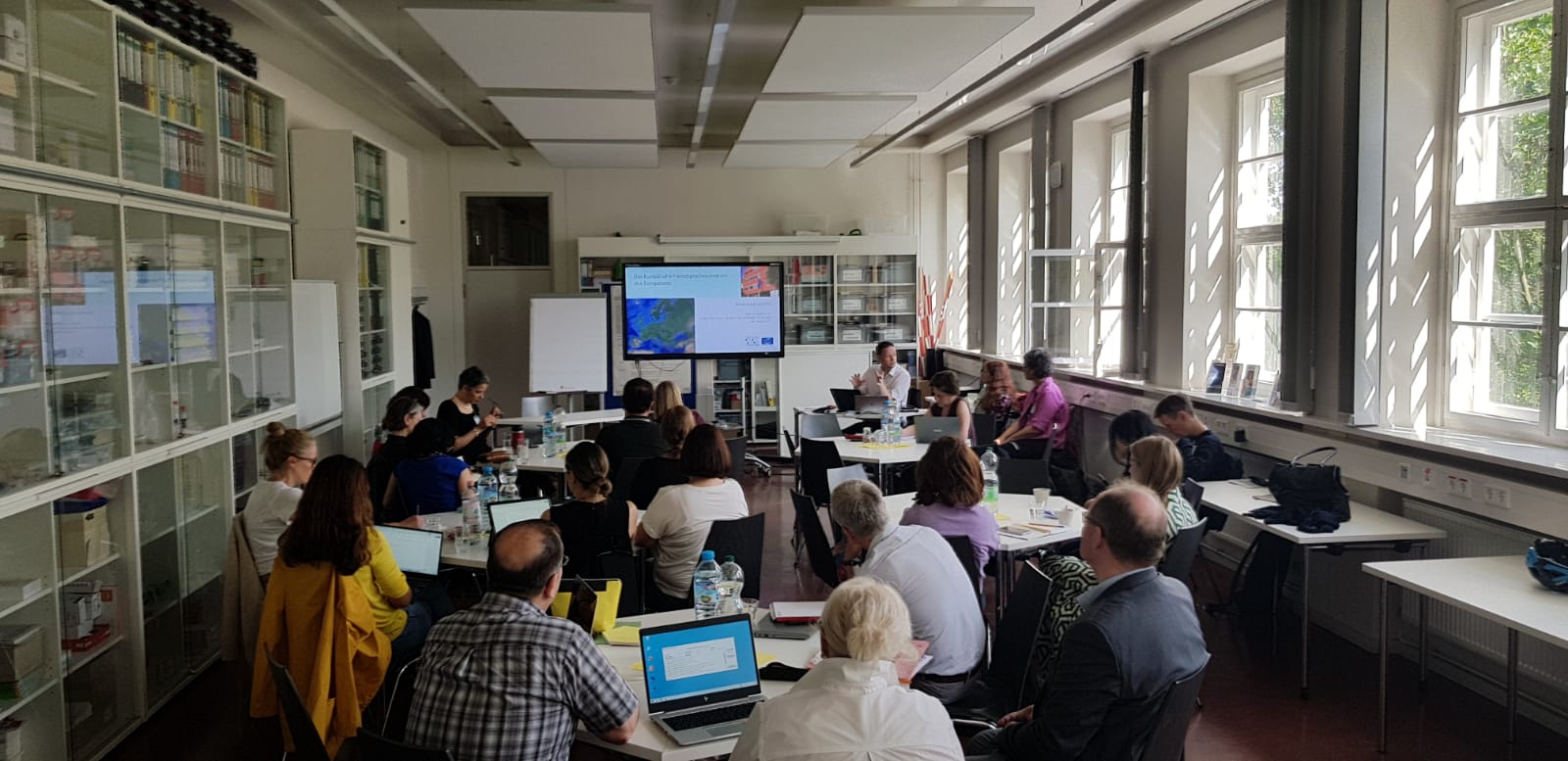
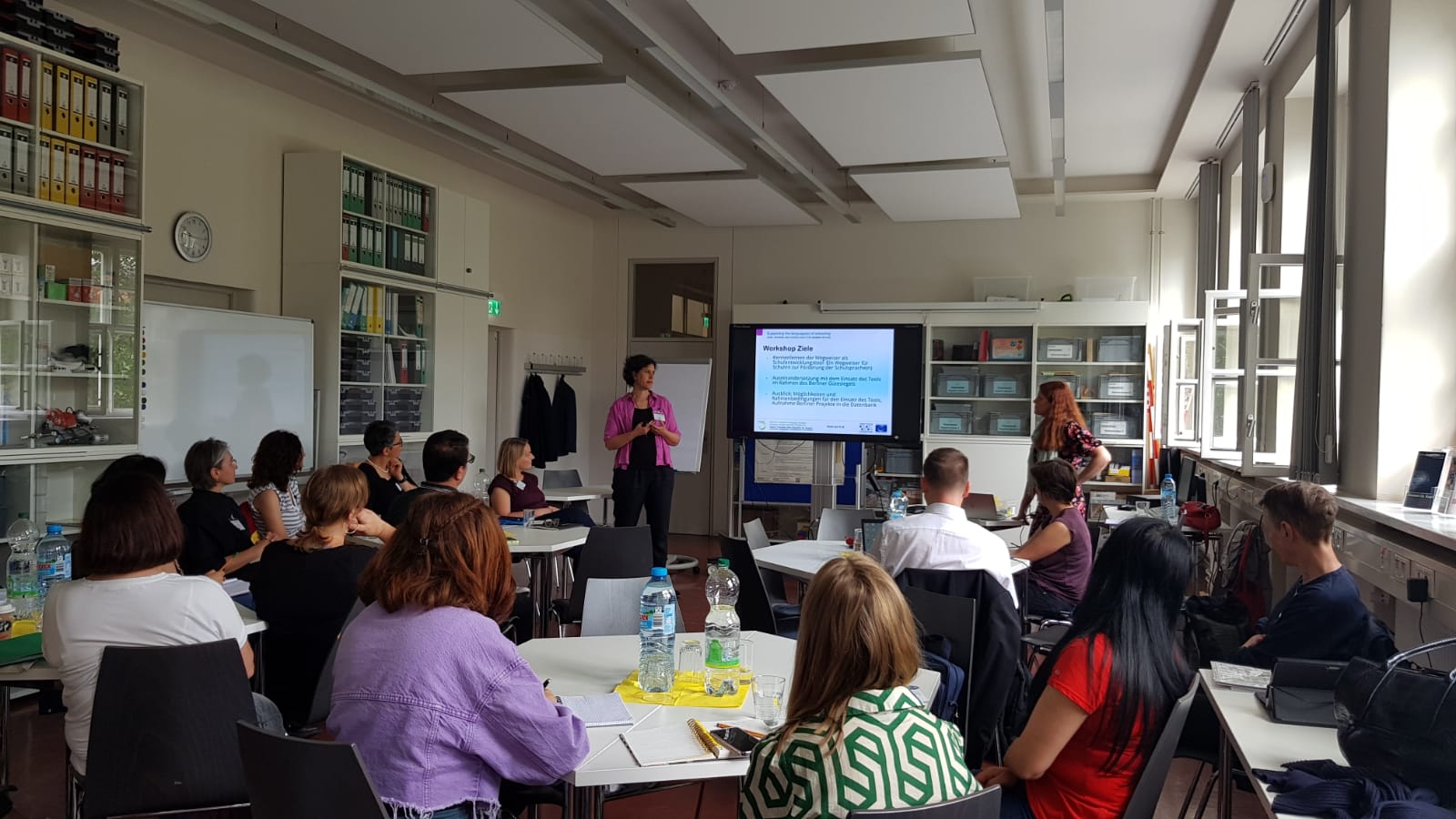
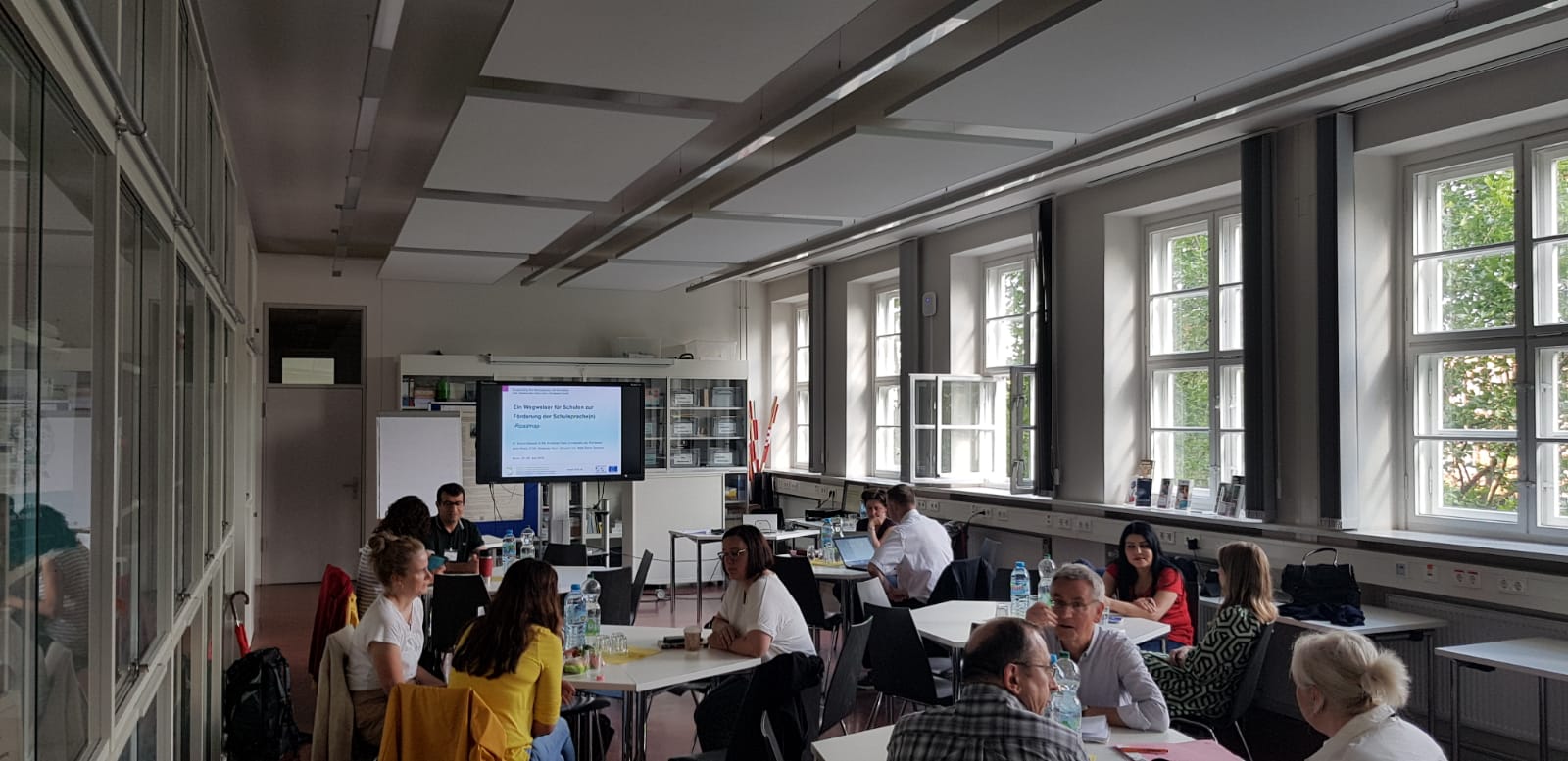
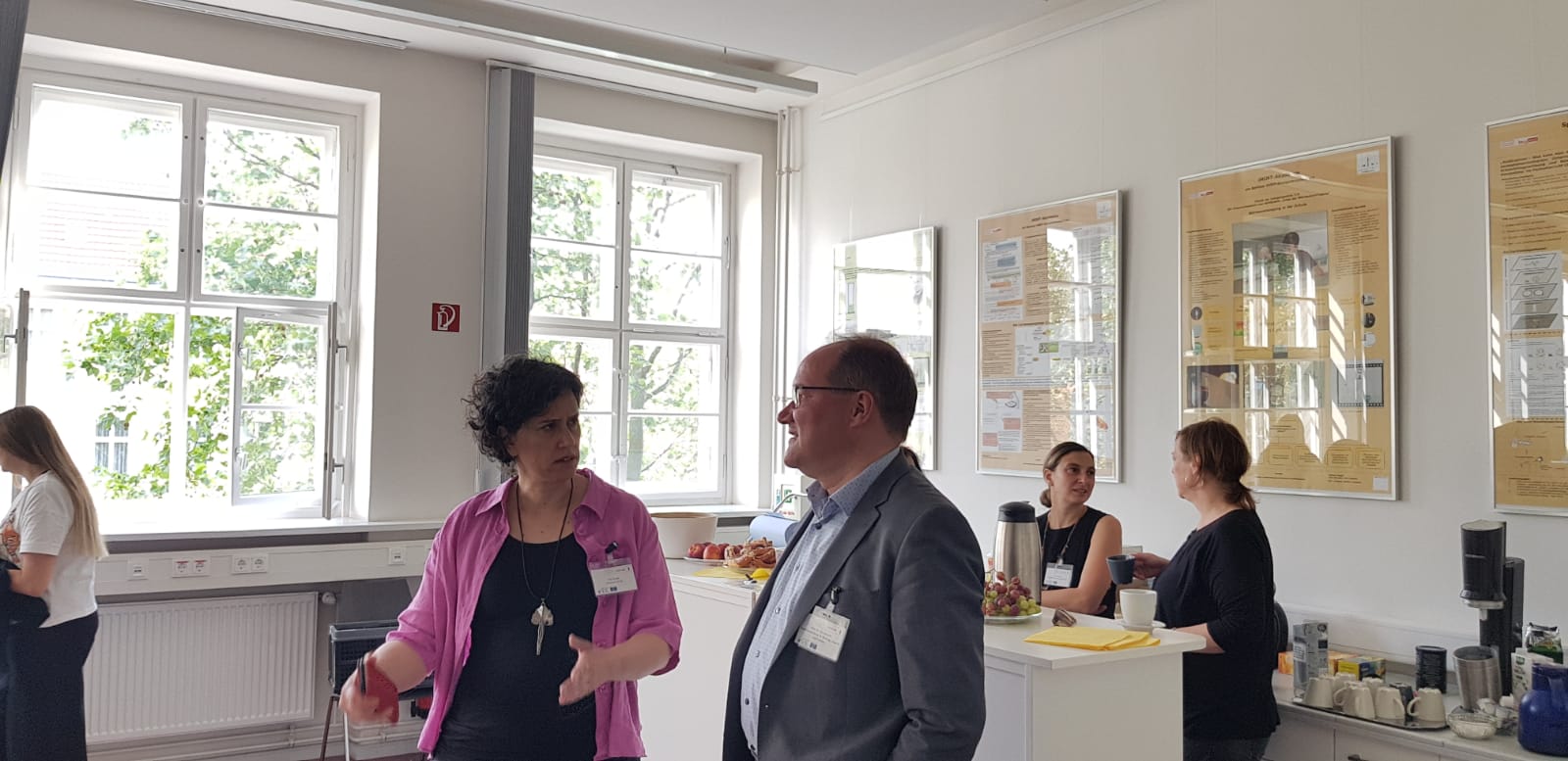
17.10.2023
Work-related language development for fair migration and sustainable integration and participation — „Deutschkenntnisse dort fördern, wo sie dringend gebraucht werden: am Arbeitsplatz!“
Date: 8 September 2022 and 9 May 2023, Germany
ECML experts: Matilde Grünhage-Monetti, Alexander Braddell and Christophe Portefin, Language for Work website, network and insights
Local organiser: Matthias von Gehlen, Goethe-Institut
Participants: 24 (8 September 2022) and 49 (9 May 2023)
“Developing the language of the immigration country (L2) for adult migrants for and at work is teamwork.” This could be the motto of the Language for Work (LfW) National Support for Germany 2022/23. This was split into two events: a face-to-face round table, during the 25th Metropolis Conference, Berlin on 8 September 2022 and an online Workshop on 9 May 2023.
The round table (Fair Migration section) presented the point of view of L2 practitioners, researchers and providers, as well of employers and trade unions, stressing the need for partnership and joint action. The audience welcomed this systemic approach. The Clavis magazine for Labour Market and Integration reported on it along with other nine workshops in a special edition dedicated to the conference (www.bmas.de/SharedDocs/Downloads/EN/Topics/Labour-Market/imcb-2022-voices-and-insights.pdf? __blob=publicationFile&v=2).
The second event brought together L2 research and practice, business, trade unions, workers’ councils, labour administration and BAMF (Federal Office for Migration and Refugees). They discussed structures and conditions for fair, effective and sustainable ways to support migrant workers learning German for and at work.
In both events language was discussed as instrument for action in the context of work, constructing and giving meaning to ones’ own activities and enabling the speakers to act upon their world. Such an understanding requires approaches embedding language learning in the context in which it is used and gets its meaning: the workplace.
Matilde Grünhage-Monetti
08.11.2024
National training workshop: Supporting multilingual classrooms (30 – 31 October 2024, Wiesbaden, Germany)
Local organiser: Daniela Neumann, Hessian Ministry of Culture, Education and Opportunities
ECML experts: Catherine Carré-Karlinger (Austria), Chantal Muller (Belgium)
Participants: 22 (teachers of the language of schooling, teachers of the language of schooling as a second language, school advisers)
The two-day workshop on the topic of “Young migrants: Supporting Multilingual Classrooms” was very well planned and professionally carried out by the moderators. Both have great expertise and substantial experience in the area of teaching practice and the inclusion of plurilingual approaches in foreign language teaching.
Short film excerpts were used to highlight examples of authentic situations from everyday classroom life. This gave the participants the opportunity to identify well with the respective situation in terms of their everyday working lives. This also enabled them to exchange ideas about their own teaching practices and teaching experiences regarding the inclusion of multilingualism in foreign language teaching.
During the workshop, the moderators also referred to relevant websites that address the topic of plurilingual approaches in foreign language teaching. Using examples teaching material, the participants received excellent recommendations for action and tips for trying out in their own lessons, from which their colleagues at the schools can ultimately also benefit.
As far as the choice of methodology during the workshop is concerned, the participants were able to exchange ideas in the form of individual and group work, which was found to be very beneficial and helpful. In addition, there were numerous opportunities for discussions in the plenary session; various practical exercises complemented the event.
The moderators proved very forthcoming and were always available to answer questions from the participants.
Daniela Neumann, local coordinator, 7 November 2024
ECML project website: Supporting multilingual classrooms, ECML-EC cooperation agreement 2024 "Innovative methodologies and assessment in language learning"
28.03.2023
European Language Gazette #63: enjoy the latest issue!
The European Language Gazette, the ECML's e-newsletter, provides up-to-date news about the ECML (events, projects, resources) and other relevant sectors of the Council of Europe as well as of our partners. It focuses on national developments in the field of language education in the member states and beyond.
Enjoy the latest issue: English – French
European Language Gazette no. 63 (January – March 2023)
Table of contents:
“A new Council of Europe Recommendation on language education: the importance of teacher education”
ECML programme developments 2020-2023 – “Inspiring innovation in language education: changing contexts, evolving competences”
- Save the dates!
- Launch event of the ECML Call for proposals for the 2024-27 programme, 15 May 2023
- ECML Summer Academy, Graz, 3-7 July 2023
- “Enhancing language education in cross-border vocational education education (initial/in-service)”: a critical topic all over Europe
ECML national support event
- “Diving into deep learning” – Vlaamse CLIL-studiedag (Brussels, Belgium, 6 March 2023)
Recent ECML resources
- Selected ECML flyers in German
- Selection of ECML resources and projects in German
- Publication translations
- Inventory of ICT tools and OERs: discover the latest resources!
Publications quoting the work of the ECML
- Related ECML work on language awareness, the language of schooling, subject classes, mediation, learning environments
European Day of Languages: EDL t-shirt contest
- EDL t-shirt 2023
- EDL t-shirt contest 2024
Training and consultancy activities
- Launch of a series of 48 language education workshops in member states
National developments
- Austria: competition for the European Language Label in Austria 2023
- France
- LISEO highlights the work and resources of the ECML and national language policies in Europe
- World Language Barometer 2022 – launch of the 4th edition
- Germany: MitSprache Deutsch4U - a programme for non-profit organisations to foster learning environments where diversity flourishes
- Ireland
- Erasmus+ School Education: The impact of mobility projects on the professional development of staff
- #ThinkLanguages Week 2023 (27 November – 1 December 2023)
- Canada: 2020-2021 Annual Report of the Official Languages and Bilingualism Institute (OLBI)
Professional Network Forum of the ECML
- Forthcoming events of the Forum members
- Eaquals webinar series 2023
- ECSPM: International Symposium “The social role of higher education: Developing the civil society’s awareness and impacting policies on the role of multilingualism in education” (Strasbourg, France, 22-24 March 2023)
- 10th EDiLiC conference (University of Copenhagen, Denmark, 28-30 June 2023)
- ICC – the International Language Association: conference, articles, new YouTube channel
- “Future of languages”: FIPLV Nordic-Baltic Region Conference (Reykjavik, Iceland, 8-9 June 2023)
In memoriam – Evangelia Moussouri and Tony Fitzpatrick
Council of Europe developments
- Towards the 26th session of the Council of Europe Standing Conference of Ministers of Education: a series of consultations
- CEFR online workshop series
- The European Charter for Regional or Minority Languages
- The European Charter for Regional or Minority Languages is celebrating its 25th anniversary
- Recent reports: Netherlands, Sweden
- Council of Europe online bookshop: recent publications
News from other organisations
- International Colloquium “Plurensa-2023: Multilingualism/plurilingualism, teaching and learning, complexity and integrity: epistemological, pedagogical and political perspectives” (7-10 June 2023, Montpellier, France)
- EU: European Year of Skills 2023, recent EU resources
- OECD: recent resources
- International Mother Language Day – UNESCO event “Multilingual education – a necessity to transform education” (21 February 2023)
- Global Citizenship and Multilingual Competences: new teaching module
- The European Wergeland Centre: recent resources
- New handbook “31 basic activities”
- “How does Artificial Intelligence influence the way teachers teach and students learn to live in a democracy?” – Webinar recorded on 7 February 2023
- Journal of International Mobility: special issue on Interculturality, intercultural skills and mobility in adult education – Call for paper until 28 April 2023
- Journal Education Sciences: special issue on Multiculturalism in higher education: current trends, challenges, and practices – Call for papers until 31 July 2023
- Babylonia, the Swiss Journal of Language Education: latest issue
Quick links
28.06.2022
National training workshop "Supporting Multilingual Classrooms" (15 – 16 June 2022, Dresden, Germany)
Local organiser: Rachel Bowden, Technische Universität Dresden
ECML experts: Brigitte Gerber, Switzerland; Chantal Muller, Belgium
Participants: 25 (foreign language teachers, teachers of other subjects, teacher educators, teachers of the language of schooling, school administrators, educational researchers)
“The first ever Supporting Mulitlingual Classrooms workshop in Germany was held on the 15th and 16th of June at Gymnasium Dresden Johannstadt and Friedrich Schiller Gymnasium Pirna. Participants included school leaders and teachers from GDJ and FSGP, for whom multilingual education is a central focus area; German as a second language teachers and language assistants from a number of other Dresden and Pirna schools; and teacher educators from TU Dresden.
The workshop aimed to enrich educators’ knowledge, attitudes and skills for working with multilingual students in their classrooms and schools. During the highly interactive workshop, participants reflected upon and shared their experiences, and engaged with research-based insights and practical activities. Focus areas included: multilingualism, language in all subjects, everyday language vs. academic language, language-sensitive teaching, resources for supporting multilingual classrooms.”
Rachel Bowden, local organiser, 25 June 2022
ECML project website: Supporting multilingual classrooms – EU-ECML cooperation agreement 2022 "Innovative methodologies and assessment in language learning"
13.10.2021
Relating language curricula, tests and examinations to the Common European Framework of Reference (RELANG): ECML national training workshop (7 October (online) - 8 October (face to face), Germany
Local organiser: Anna Schönbach, Pädagogisches Landesinstitut Rheinland-Pfalz
ECML experts: José Noijons, the Netherlands
Participants: 22 (language testers and examiners, item writers, teachers and teacher trainers; curriculum developers, language inspectors, policymakers)
“Our group of teaching advisors, teacher trainers and representatives of decision-makers is grateful for this hybrid workshop that informed us about the necessity of setting priorities in the selection of descriptors contained in the CEFR Companion Volume (CV). It helped us to focus on the action-oriented approach that is aiming at supporting the learner as a social agent. As every successful action requires focus, teaching by objective in the wording of can-do-statements in authentic settings becomes particularly important. This workshop has helped the experts to develop a deeper understanding of the role of the social dimension in languages, which also includes plurilingualism and the importance of competences related to the digital age. Our experience from exchanging ideas in these workshops has shown that the best guidance for teachers, teacher trainers can be achieved through this process of focusing and setting priorities.
Another benefit was enabling our experts to disseminate ideas about the multiple dimensions of mediation. Our suggestions on intercultural activities, plurilinguistic tasks and the integration of transferable skills in our teaching could be updated and consolidated. We became aware of differences between assessment practices and teaching practices, which has a huge potential of contributing to the implementation of an action-oriented and task-based approach in teaching, learning and assessment and thus make teaching and assessment more relevant to the learner. Tasks, activities and scenarios can now be rendered more meaningful to the learner – both in teaching and assessment. Thank you very much for the inspiring input and an opportunity of bringing us together and exchanging ideas.”
Anna Schönbach, local organiser, 9 October 2021
ECML project website: RELANG – EU-ECML cooperation agreement 2020-2021 "Innovative methodologies and assessment in language learning"
03.05.2019
ECML National Support Event "Selecting and evaluating digital resources for teaching language and educating global citizens" (Munich, Germany, 26 March 2019)
Date: 26 March 2019
Venue: Ludwig Maximilian University of Munich, Germany
Local organisation: Claudia Owczarek, Chair of TEFL, LMU Munich, Germany
ECML expert: Joseph Hopkins, Universitat Oberta de Catalunya, Barcelona, Spain
Participants: 19 teachers of German from primary, secondary and vocational school and international participants from a university context
*****
The workshop was held by Mr. Hopkins at the Ludwig-Maximilians-Universität as part of the TEFL Day, a day of professional development for teachers. The TEFL Day was embedded within the context of the international conference "Educating the global citizen: International perspectives on foreign language feaching in the digital age".
19 teachers participated in this training event, including German teachers from primary, secondary and vocational school and a few international participants (from Sweden, Mexico, Brazil ...) from a university context .
The workshop began with a presentation and an exploration of the ECML Inventory of ICT tools and open educational resources (e.g. Mentimeter, Google Slides, Google Sites, Google Docs, Wheel Decide, Padlet). In a next step, participants were given time to evaluate some tools designed for language teaching and for promoting global citizenship. Finally, the teachers developed ideas about how the presented tools could be integrated into their individual teaching contexts.
The participants gave very positive feedback and highlighted that they will put their newly gained knowledge into practice in their respective teaching environments.
Claudia Owczarek, local organiser of the workshop
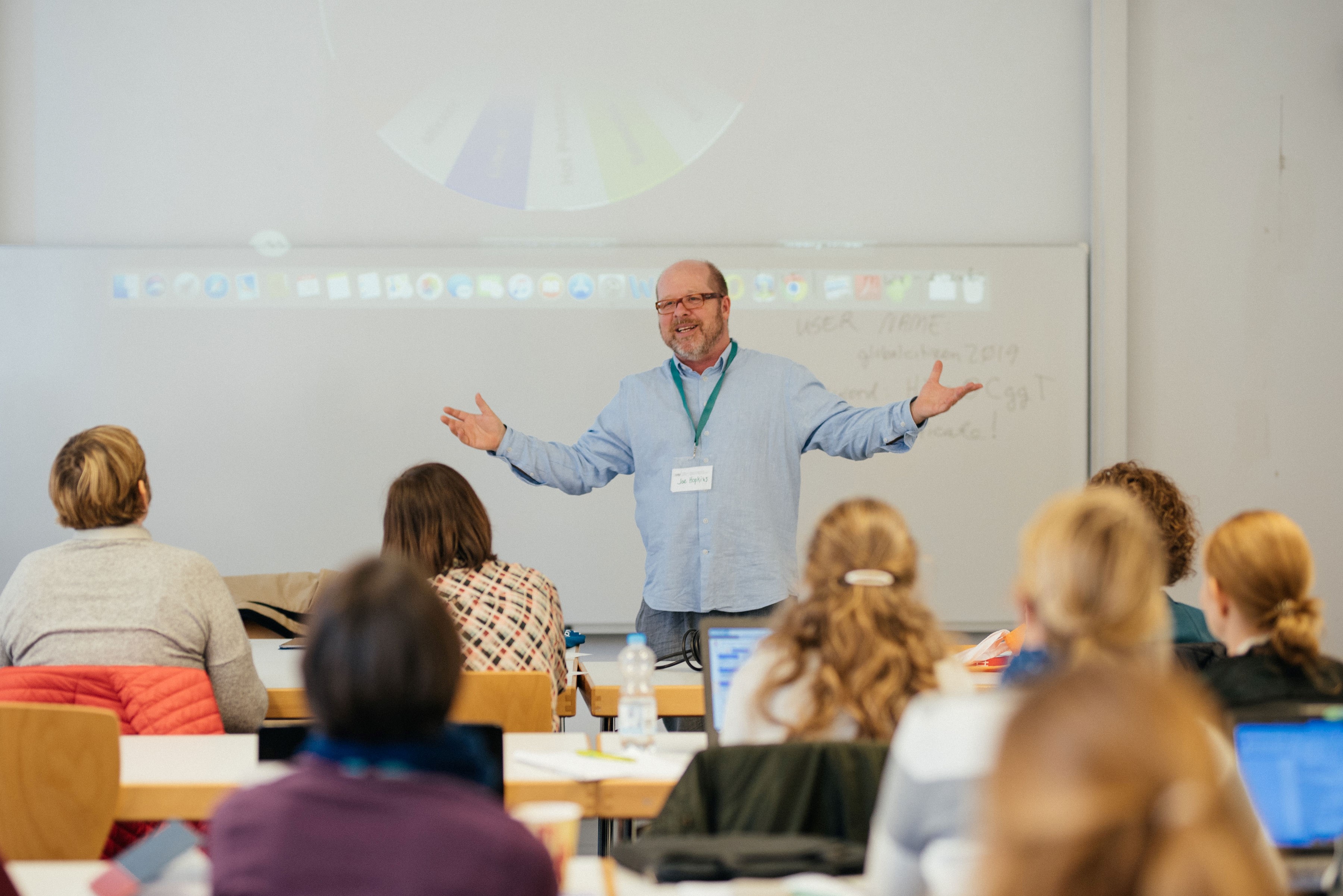
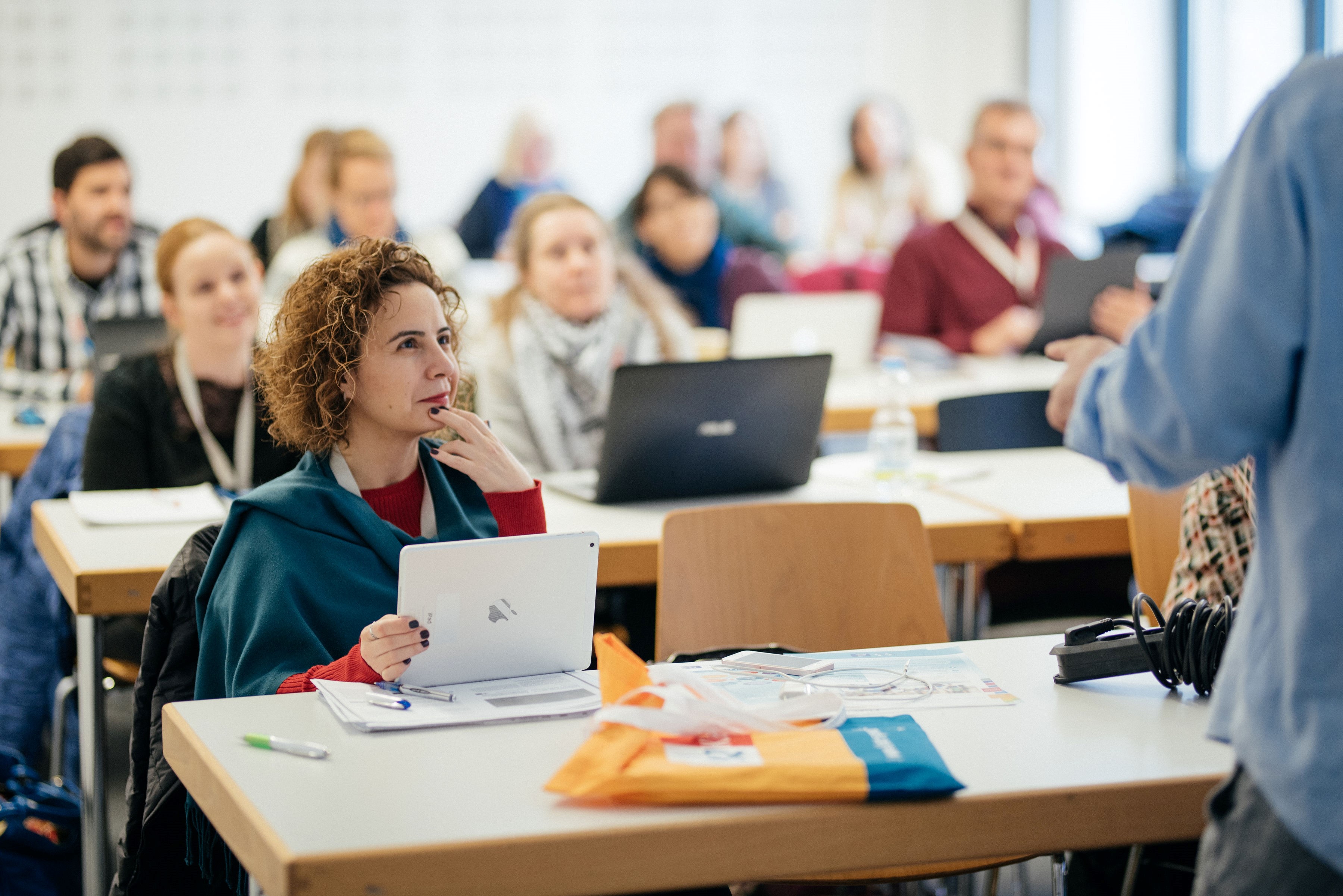
02.05.2019
Workshop "Selecting and evaluating digital resources for teaching language and educating global citizens" (Munich, 26 March 2019)
Date of the event: 26 March 2019
Venue: Ludwig Maximilian University of Munich, Germany'
Organisation: Claudia Owczarek, LMU Munich, Germany
ECML expert: Joseph Hopkins, Universitat Oberta de Catalunya, Barcelona, Spain
*****
The workshop was held on 26 March 2019 at the Ludwig-Maximilians-Universität as part of the TEFL Day within the context of the international conference "Educating the global citizen: International perspectives on foreign language teaching in the digital age".
19 German teachers from primary, secondary and vocational schools and a few international participants (from Sweden, Mexico, Colombia and Brazil) took part.
The workshop began with a presentation and an exploration of the Inventory of ICT tools and open educational resources (e.g. Mentimeter, Google Slides, Google Sites, Google Docs, Wheel Decide, Padlet). Then, through a series of activites, teachers were asked to critically evaluate various tools for language teaching and for promoting global citizenship. Finally, they developed ideas about how the presented tools could be integrated into their individual teaching contexts.
The participants gave very positive feedback and highlighted that they will put their newly gained knowledge into practice in their respective teaching contexts.
Claudia Owczarek, local organiser
12.07.2018
ECML training event in Germany: Conference for multipliers on the promotion of plurilingualism in schools in Hamburg (16 June 2018)
Date and place: 16 June 2018, Hamburg, Germany
Local organisation: Julia von Rosen
Trainers: Ana-Isabel Andrade, Michel Candelier and Anna Schröder-Sura
Participants: 37 primary and secondary teachers, teacher trainers, university researchers/teachers, representatives of the Hamburg Ministry of Education
The conference was an impulse and multiplier event in the area of plurilingual education and brought together a wide range of different educators and experts working in Hamburg’s education and school system (teachers of various primary and secondary schools, specialists, educators, and academics). It was aimed at informing about the state of theory and practice in plurilingual education with a focus on “pluralistic approaches” and FREPA.
The ECML moderators’ expertise, combined with the participants’ different backgrounds, interests and professional perspectives in language didactics, enriched the contributions to discussion and professional exchange. At the same time, certain thematic areas could only be touched on or presented by way of example during the conference. The wish to further deepen cooperation on those areas led to the establishment of a working network of interested participants.
A mailing list was organised to enable communication and plan a first working meeting in September. We are looking forward to continuing the interesting and productive work on promoting multilingualism in the schools of Hamburg!
Julia von Rosen, local organiser
*****
MultiplikatorInnen-Tagung zur Förderung von Mehrsprachigkeit an Hamburger Schulen
Die Tagung verstand sich als Impuls- und Multiplikatorenveranstaltung im Bereich Mehrsprachigkeitsdidaktik und hatte zum Ziel, möglichst viele verschiedene Gruppen von Lehrenden und Experten im Hamburger Schul- und Bildungssystem (Lehrende aus dem Primar- und Sekundarbereich unterschiedlicher Schularten, FachreferentInnen, AusbilderInnen, WissenschaftlerInnen) zusammen zu bringen, um auf einer breiten Basis über den aktuellen Stand in Theorie und Praxis der Mehrsprachigkeitsdidaktik, mit besonderem Fokus auf den „pluralen Ansätzen“ und dem REPA zu informieren.
Durch die große Expertise der ModeratorInnen des EFSZ und die unterschiedlichen sprachendidaktischen Hintergründe, Interessen und beruflichen Kontexte der TeilnehmerInnen waren der inhaltliche Input und der kollegiale Austausch sehr anregend. Gleichzeitig konnten natürlich viele Themen im Rahmen der Tagung nur angerissen werden oder exemplarisch präsentiert werden, so dass der Wunsch nach einer Fortsetzung der gemeinsamen Arbeit artikuliert wurde, der durch die Einrichtung einer Arbeitsgruppe bzw. eines Netzwerks interessierter TagungsteilnehmerInnen realisiert wurde.
Über einen im Anschluss an die Tagung erstellten MailVerteiler soll die Kommunikation gewährleistet und ein erstes Arbeitstreffen im September geplant werden. Wir sind gespannt und hoffen auf eine interessante und ertragreiche Fortsetzung der Förderung der Mehrsprachigkeit in Hamburger Schulen!
13.03.2018
ECML project "Pro-Sign II - Promoting excellence in sign language instruction": developments in Switzerland, Ireland, Germany, Canada and Serbia
Tobias Haug reports that the University of Applied Science of Special Needs Education (HfH, Zurich, Switzerland) has set up a CEFR1 working group to align the existing Swiss German Sign Language curricular to the Common European Framework of Reference for Languages (CEFR). The outputs of the ECML "Pro-Sign project - Promoting excellence in sign language instruction" are a very important resource for this process. The working group, led by Tobias Haug, is also in close cooperation with other stakeholders, mostly with the Swiss Deaf Federation.
In Ireland, Lorraine Leeson and Carmel Grehan, along with student ISL2 teachers Anita Nolan and Eimear Mowlds, have been working on the European Language Portfolio (ELP) piloting with students at Trinity College Dublin. They have talked with students at three points over the course of this academic year about their experiences of using the pilot ELP and explored their thoughts on its usefulness.
At Humboldt-Universität zu Berlin, Germany, Christian Rathmann and Thomas Geissler have been working on the implementation of ELP with the students enrolled in BA Deaf Studies. Two focus groups have been arranged, and the experiences were shared. Moreover, the team at the Humboldt-Universität zu Berlin has been working on sign language assessment in three areas: production, reception and interaction. Another focus group has been arranged as well.
Colleagues at both institutions are analysing the data to prepare for the Pro-Sign II network meeting in Graz (Austria, 5-6 April 2018). The project team is very much looking forward to telling you about our progress at the network meeting!
The Sign Language Curriculum in Deaf Studies at Humboldt University, Germany, was revamped and is now aligned with the CEFR.
Third, the preparations of the Pro-Sign Conference in Belgrade, Serbia, include the release of a "Save the date" announcement, and the call for papers will be distributed soon.
In Toronto, Canada, a CEFR workshop has been delivered by Christian Rathmann (21-24 February 2018).
Beppie van den Bogaerde represented the Pro-Sign II expert team at an EALTA organised event, VIth EALTA CEFR SIG in Dublin, Ireland, on 27 January 2018, “The CEFR Companion Volume with new descriptors: uses and implications for language testing and assessment”. A report will be published soon, drafted by Prof. Dr. David Little.
The Pro-Sign II project team:
Christian Rathmann (coordinator), Tobias Haug, Lorraine Leeson, Beppie van den Bogaerde
*****
1 CEFR: Common European Framework of Reference for Languages: Learning, teaching, assessment
2 ISL: Irish Sign Language
3 ELP: European Language Portfolio
05.03.2018
Setting the stage for 2018 training workshops in 9 ECML member states
On 2 March 2018 fifteen local organisers from Armenia, Bosnia and Herzegovina, the Czech Republic, Germany, Greece, Norway, Poland, Slovenia and “the former Yugoslav Republic of Macedonia” met ECML expert teams to prepare national training events in the areas of Plurilingual education (“FREPA - Plurilingual and intercultural competences: descriptors and teaching materials”) and Online technology (“ICT-rev - Use of ICT in support of language teaching and learning”).
These events are examples of the ECML offer of Training and Consultancy for member states - bilateral support responding to specific national priorities whereby previously successful ECML project teams share their expertise with national authorities and local experts to devise and implement in-country activities, tailored to the particular context and target audience.
A big thank you to national organisers and expert teams for their support and cooperation in preparing the delivery of 8 ICT-REV and 4 FREPA training activities for professionals in language education in these nine countries.
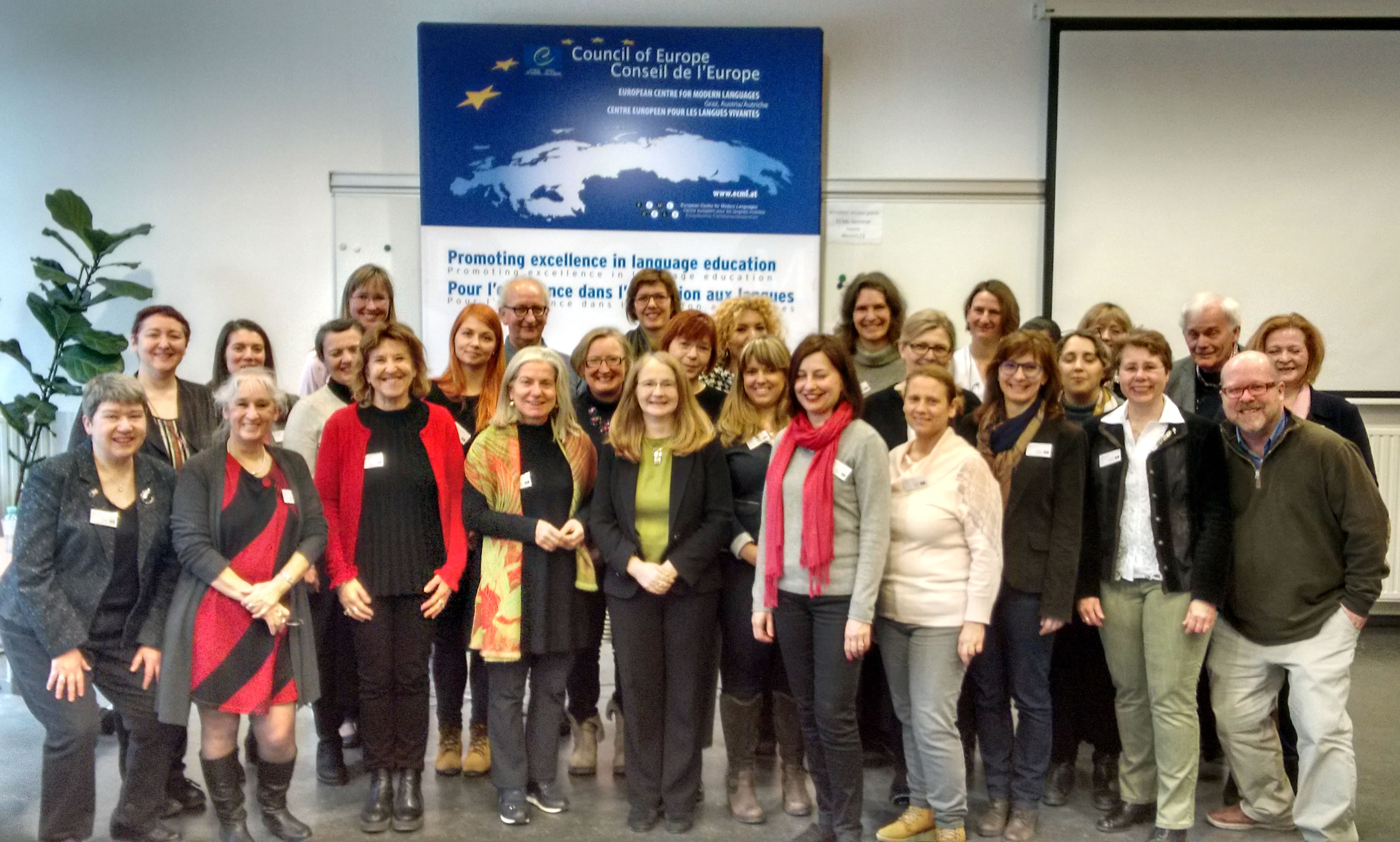
05.05.2017
Recently published: European Language Gazette no. 36 (January-April 2017)
The European Language Gazette, the ECML's e-newsletter, provides up-to-date news about the ECML (events, projects, resources), the Language Policy Unit and other relevant sectors of the Council of Europe, as well as our partners. It focuses on national developments in the field of language education in the member states and beyond.
Read the latest issue: English - French
*****
Issue no. 36 – Contents
Focus on ECML programme developments – "Languages at the heart of learning" (2016-2019)
Latest project developments
"Language awareness in subject classes": participate in an online survey
"Towards a Common European Framework for Language Teachers": latest news
e-lang project in 2016: laying the foundations for a digital literacy in the language teaching and learning context
"Promoting excellence in sign language instruction (PRO-Sign2)": ECML workshop (Graz, Austria, 1-2 March 2017) – cooperation partnership with Moscow State Linguistic University
"A quality matrix for CEFR use": ECML workshop (Graz, Austria, 15-16 November 2016) – Interview with Denis Vigneron, French participant
ECML training and consultancy for member states
Network meeting of local organisers and ECML consultants (Graz, Austria, 7-8 March 2017) and upcoming national training workshops
National training workshop "Supporting multilingual classes" in Slovenia (Koper, 2-3 March 2017)
National workshops "A pluriliteracies approach to teaching for learning" in Malta (Floriana, 2-3 March 2017) and Latvia (Riga, 6-7 March 2017)
Forthcoming events
Recent ECML publication: Language skills for successful subject learning – CEFR linked descriptors for mathematics and history/civics
European Day of Languages
National developments in Armenia, Austria, Canada, France, Germany, Luxembourg, Malta, Poland, Slovenia, Switzerland
Professional Network Forum of the ECML: upcoming events
Council of Europe developments
The linguistic integration of adult migrants: some lessons from research
Council of Europe Ad hoc Committee of Experts on Roma and Traveller Issues (CAHROM) (ECML, Graz, Austria, 29-31 March 2017)
International Roma Day – 8 April
Pestalozzi programme: creating an online community of action researchers – summer school 2017
Framework Convention for the Protection of National Minorities: developments in Albania, Armenia, Azerbaijan, Bosnia and Herzegovina, Finland, Kosovo*, Lithuania, Moldova, Montenegro, Norway, Romania, Russian Federation, Slovenia, Sweden, Switzerland, Ukraine, United Kingdom, "The former Yugoslav Republic of Macedonia"
Urban policies for inclusive integration and diversity advantage: join the Intercultural Cities 2017 Milestone Event (Lisbon, Portugal, 28-29 November 2017)
Cyprus Chairmanship Conference in Nicosia: "Securing Democracy through Education"
Recent publication
Editorial news from other organisations: Eurostat, Eurydice, OECD, Unesco, Mercator European Research Centre on Multilingualism and Language Learning, Babylonia
Quick links
03.11.2016
European Language Gazette : enjoy the latest issue!
The European Language Gazette, the ECML's e-newsletter, provides up-to-date news about the ECML (events, projects, resources), the Language Policy Unit and other relevant sectors of the Council of Europe, as well as our partners. It focuses on national developments in the field of language education in the member states and beyond.
Issue no. 33 (September - October 2016): available in English and in French.
18.08.2016
Conference to promote the learning of German in Spanish schools (Madrid, 23-24 June 2016)
On 23-24 June the German Embassy in Madrid, together with the Universidad Complutense and the Spanish Association of Teachers of German, FAGE, organised a 2-day conference to promote the learning of German in Spanish schools. German teachers from across Spain were treated to a plethora of keynote speeches covering a broad range of topics from how the brain learns languages through the professional development opportunities for teachers afforded by the Erasmus+ programme of the European Commission to the study opportunities for school pupils outside Germany via the Zentralstelle für das Auslandsschulwesen, ZfA. But teachers did much more than simply listen – they were able to engage actively in round table discussions and in working groups to discuss solutions to the common challenges they face. On the evening of the 23rd all participants were invited to a reception hosted by the German Ambassador to Spain, Mr. Peter Tempel.
On the second day, discussions continued with representatives from the Ministry of Education, Culture and Sport and from seven of the regional educational authorities. In her keynote delivered in Spanish, Sarah Breslin, Executive Director of the ECML, widened the discussion on German to the value of all languages and to the contribution of the ECML to quality language education. Teachers and decision-makers present gave their overwhelming support to the idea of Spain returning to the ECML. In the meantime, Sarah encouraged them to delve into the ECML’s treasure trove of resources, many of which she presented in detail.
The ECML was invited to take part in this event by Mr. Peter Platte, Counsellor for Education and Culture, German Embassy, Spain.
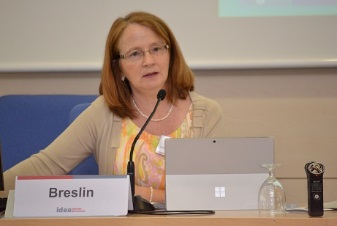
Sarah Breslin, Executive Director of the ECML
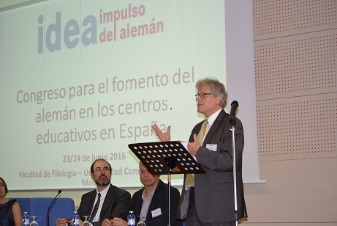
Peter Platte, Counsellor for Education and Culture, German Embassy, Spain
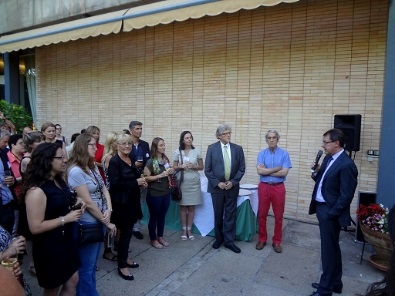
Reception at the residence of the German Ambassador to Spain
Photo credits: @ German Embassy, Spain